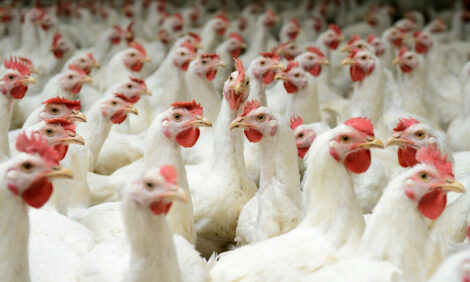



Nepal Capital Faces Peril of Bird Flu
NEPAL - After the confirmation of bird flu avian influenza in a farm in the Nepali capital Kathmandu, the alert level among the residents of Kathmandu has been elevated.More than 15,160 chickens died of avian influenza in the past two weeks in the farm which was later confirmed by the Animal Health Directorate.
The area has been declared as crisis zone and works like disinfecting and dumping the chicken feed has already been carried out.
Talking to Xinhua, director of directorate of National Animal Health Ram Krishna Khatiwada said that preventive measures have been adopted to check the bird flu while the area would be kept under high alert.
Meanwhile, the confirmation of bird flu in the capital has risen concerns among people of every walk of life. Chicken consumption has decreased and people in poultry farms although more cautious have been fearing that their poultry may also be struck with the deadly virus.
Ram Prasad Risal, who owns a small poultry farm in the Bagdole of Kathmandu told Xinhua that he feared that his chicken would conquer the virus. Risal owns a few hundred chickens in his farm and it is his prominent way of earning his daily bread and butter.
"There is a lot of investment in the farm. I earn a living by selling eggs and chicken. If the disaster occurs, all my investment will go in waste and I will be financially devastated," Mr Risal said.
Although bird flu has been traced in Kathmandu, it is yet to confirm whether the bird flu is prominently existing in the capital because the chicken that are available in the poultry farms in capital are usually supplied by the farms outside the valley.
Earlier this month the bird flu had been confirmed at a poultry firm in Pharphing, Kathmandu.
Likewise, on 12 March, the government had declared five village development committees of Jhapa district and Sunsari district in eastern Nepal as bird flu affected zone.
Prior to that, the strains were also confirmed in Bhaktapur of the capital.
China's Tibet Autonomous Region has also been placed into a state of alert after Nepal reported an outbreak of bird flu.
More and more cases of bird flu have been repeatedly found in different parts of the capital though the government had declared Nepal as the bird flu free country on 13 July last year.
Similarly, of February this year, the parliamentary Committee on Natural Resources and Means had urged the government to take special and immediate measures into eradicating the disease and provide more funds and actions.
Meanwhile several campaigns have been launched in audio and visual media regarding ways to prevent transfer of bird flu among humans and reduce the fear and menace among the general public.
The campaigns direct that hands and food should be thoroughly washed, cleaned and cooked well before consumption.
Sales of chicken and ducks has reduced by a large percentage while the prices of other meat items like mutton, beef and pork have increased.
So far no reports of availability of the virus in human or human deaths have been reported in the Nepal after the series of outbreak in Nepal.
According to World Health Organization (WHO) less than 600 cases of H5N1 influenza A infection have been reported in humans.
Since 2003, the H5N1 strain has infected 573 people and killed 336, notably in Indonesia, Egypt, China, Cambodia and Indonesia, according to WHO figures from 2003-2011.
The WHO says the primary risk factor for human infection with the avian virus appears to be direct or indirect exposure to infected live or dead animals, or contaminated environments.
However experts fear the bird flu virus could mutate into a form easily transmissible between humans and with potential to kill millions in a pandemic.
Further Reading
| - | You can visit the Avian Flu page by clicking here. |








